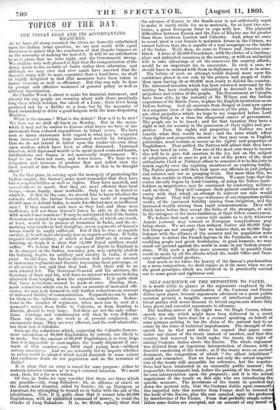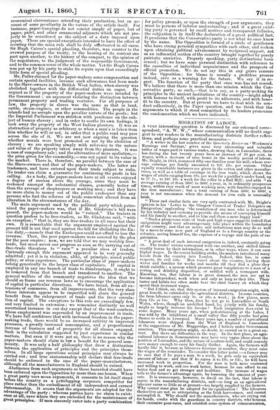SELF-SACRIFICE OF THE OPPOSITION TO PAPER.
IT is worth while to glance at the arguments employed by the Opposition against the equalization of the Customs and Excise duties upon paper, because arguments advanced on a great public occasion present a tangible measure of intellectual morality. Great parties will never descend to trivial arguments where they have great and essential arguments to advance.
The leading orator of the night was Sir Hugh Cairns, whose speech was one which might have been delivered in a court of law ; it would have done for a counsel speaking on behalf of some persons seeking to bar the claim of the natural heir to an estate by the force of technical impediments. The strength of his speech lay in: that part where he argued that paper came under one clause of the treaty instead of another, and that this country had reserved to itself under the treaty the right of raising Customs duties above the Excise. The whole argument was derived from an ingenious interpretation of clauses, with a fanciful construing of the words ; as if the treaty were an ancient document, the composition of which " the oldest inhabitant" could not remember. Now we have not only the actual negotia- tors of the treaty still accessible for reference, but the negotia- tions had been conducted in an unusually public manner ; the responsible Government had, before the passing of the treaty, put its own interpretation upon the proposals ; and it is the actual/ negotiators of the treaty on this side who are introducing the, specific measure. The provisions of the treaty in question lays; down the general rule, that the Customs duties upon commodi- ties imported into this country from France shall be lowered the level of the Excise, plus the cost entailed upon the produce by interference of the Excise. From that perfectly simple calm lation some duties are excepted, not on account of any moral or
economical circumstance attending their production, but on ac- count of some peculiarity in the nature of the article itself. For instance, paper-hangings do not consist simply of paper, but of paper, paint, and other ornamental adjuncts which are not pro- perly to be considered as the subject of a duty imposed upon paper. These are special.exceptions intended to have the effect of securing that the main rule shall be duly effectuated in all cases. Sir Hugh Cairns's special pleading, therefore, was counter to the avowed purpose of the treaty, to the bearing of its context one part upon another, to the history of the compact, to the opinion of the negotiators, to the judgment of the responsible Government, and to the common dense of the whole matter. Yet Sir Hugh Cairns was put up by his party to stake its repute upon that exceedingly little form of special pleading.
Mr. Puller claimed for the paper-makers some compensation and certain' special facilities, because such allowances had been made to the Slave-owners in the British West Indies, when slavery was abolished together with the differential duties on sugar. He argued as if the property of the paper-makers were invaded by the Government ; an argument violating the distinction between permanent property and trading ventures. For all purposes of law, the property in slaves was the same as that in land, cattle, steam-engines, or other commodities. The people in the islands had no scruple upon the peculiar nature of the goods; but the Imperial Parliament was stricken with penitence on the sub- ject of human slavery ; and in order to soothe its own feelings, it took away the property of the West Indian planters. It was an abstraction of property as arbitrary as when a man's is taken from him whether he will or not, in order that a public road may pass across the site of it. We are not now arguing the question whether morale were best promoted or not by the abolition of slavery ; we are speaking simply with reference to the nature and value of the property taken away from the planters. It was a case of compulsory sale ; and the alternative of mere spoliation,— the price given for the commodity,—was not equal to its value in the market. There is, therefore, no parallel between the ease of the Slave-owners and that of the paper-makers. The latter are tradesmen, and have entered upon their trade subject to risks. No trader can claim a guarantee for continuing the profit in his calling. As a body, the paper-makers have at all events enjoyed a degree of success above the average, since they must be reckoned amongst the substantial classes, generally better off than the average of shopkeepers or working men ; and they have no more claim to money out of the public exchequer than any persons who find the reforms of trade somewhat altered from an alteration in the circumstances of the day.
- The main argument used by the political party which patro- nized the paper-makers was, that if Mr. Gladstone's bill were passed, the paper-makers would be "ruined." The traders in question profess to be free-traders, as Mr. Gladstone said, " with an exception; that is, they are free-traders in all cases but their own. It is remarkable that the argument employed against the present Mills not that used against the bill for abolishing the Ex- cise duty,—namely that the Exchequer could not afford to lose the revenue. Then, the poor paper-makers were covered by the plea for the poor empire ; now, we are told that we may worship free- trade, but must arrest our progress as soon as the carrying out of free-trade threatens to " ruin " a peculiar class of traders. Curiously enough this argument appeared to be very generally admitted ; yet it is in violation, alike, of principle, sound public policy, or even experience. The particular class of paper-makers belong generically to the larger class of capitalists. If capital is employed in any one branch of trade to disadvantage, it ought to be removed from that branch and transferred to another. The general welfare of the community negatives the idea that we should so frame our revenue laws as to encourage the application of capital in particular directions. We have found, from all ex- tensions of commerce, from all improvements, that the very class whose interests appear to be imperilled will share the general benefit from the enlargement of trade and the freer circula- tion of capital. The exceptions to this rule are exceedingly few, and very limited in extension ; we remember distinctly no well ascertained instance in our day except that of the wool-combers, whose employment was superseded by an improvement in trade. We have full confidence that with increased freedom in the paper- making trade, there would be an increased activity in improved processes, a greatly increased consumption, and a proportionate increase of business and of prosperity for all classes engaged. Such is the calculation suggested by past experience in similar matters. But even if it were not so, there is no reason why the paper-makers should claim to bar a benefit for the general com- munity. It was only a half philosophy that drew a distinction between the application of principles and the principles them- selves. In all large operations sound principles may always be carried out ; and true statesmanship will declare that free-trade should be enforced in the case of the paper-manufacturers, although all the manufacturers in England should be ruined.
Abstinence from such arguments as those hazarded should have been enforced upon the Opposition by more than one lesson. When a great party uses mean arguments, it consents to let itself stand before the country as a pettifogging corporate competitor for place rather than the embodiment of all independent and earnest statesmanship. It avows that the arguments are adopted for the advantage of the party ; whereas parties have no claim to exist- ence at all, save where they are embodied for the maintenance of great prineiples. If men sincerely enter into a party combination for paltry grounds, or upon the strength of poor arguments, they must be persons of infetior understanding ; and if a great exist- ing party is governed by small motives and transparent fallacies, the subjection is in itself the declaration of a great political fact. It proclaims that the Conservative party is not what we once knew by the name. The Opposition is formed of a circle of gentlemen who have strong personal sympathies with each other, and reckon upon obtaining political advancement by reciprocal support, not as an influential section of the country brought together by purely patriotic anxieties. Properly speaking,- party distinctions have ceased ; but we have some personal distinction with reference to the casualties of individual acquaintance and the prospects of official promotion. We do not say this in any grave censure of the Opposition ; for blame is usually a profitless process indeed, save as a warning for the future. We say it in re- gret. The function of the party that once was has not ceased. We believe that there is more than one mission which the Con- servative party, as such,—that is to say, as a party seeking its principles in the ancient institutions of the country—might adopt with honour to itself, with profit to its adherents, and with bene- fit to the country. But at present we have to deal with its con- duct collectively, in the Paper question, and we think that the arguments to which it stood committed by its leaders pronounce the condemnation which we have indicated.



























 Previous page
Previous page